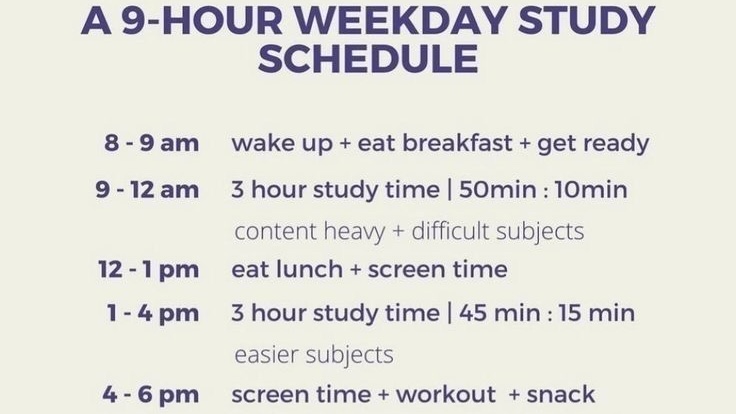Many students don’t realize that having a solid game plan can make all the difference when it comes to school. These solid plans are usually the secret of the students topping the class. Tips for building a study schedule help you stay organized, avoid cramming, and actually retain what you learn. A good study plan balances schoolwork, extracurriculars, and much-needed downtime. Let’s quickly explore some of the tips for building a study schedule.
Build a Study Schedule That Fits Your Life
All study schedules don’t have to be the same. The first step is figuring out what’s on your plate. List out your subjects, assignments, and test dates. Next, break your study time into manageable steps.

Time management hacks like time blocking are a great way to assign set hours for different subjects while ensuring you still get breaks. A study schedule template can also help you stay on track. Most importantly, build your schedule around your natural energy levels.
Set Study Goals You Can Actually Reach
Ever told yourself you’d “study math” but then ended up scrolling on your phone? Yeah, same. That’s why your goals need to be specific. Instead of “study history,” go for something like “review five pages of notes” or “complete three practice questions.” Small wins keep you motivated. Busy high school students should first focus on the most urgent and difficult. A reasonable study timetable keeps you accountable and helps you adjust as needed.
Find Your Perfect Study Spot
Your study space matters more than you think. A quiet, well-lit area with minimal distractions is so important. However, if silence drives you crazy, try soft instrumental music.

And honestly, studying in bed is just a nap waiting to happen, so stick to a desk or table. A clutter-free space can help you remain focused and less stressed. Keeping all your study materials in one spot also saves you from scrambling to find a lost textbook.
Try Time Blocking To Stay on Track
Time blocking is absolutely amazing. Instead of randomly deciding what to study, set specific time slots for each subject. For example, 45 minutes of science, a 10-minute break, and then 30 minutes of reviewing notes. Busy high school students juggling classes, sports, and social life will find this method especially helpful. Using a study schedule template can make this even easier; just input your subjects and stick to the plan.
Don’t Skip Breaks
Marathon study sessions might sound productive, but your brain needs rest. Take short, scheduled breaks to keep you sharp and prevent burnout.

The Pomodoro Technique is an incredible hack. With it, you study for 25-50 minutes, then take a 5–10 minute break. Use that time to stretch, grab a snack, or take a quick walk. A good study timetable includes breaks so you stay fresh.
Use a Study Schedule Template for a Head Start
If you’re unsure where to start, a study schedule template can help. Templates help you divide your study sessions, track assignments, and ensure nothing falls through the cracks. You can find printable or digital versions to fit your style. A structured schedule keeps everything organized, whether you’re planning daily, weekly, or monthly. This is especially useful for busy high school students juggling multiple subjects and responsibilities.
Avoid Distractions and Stay Focused
Honestly, distractions are everywhere. One minute, you’re studying; the next, you’re deep in a TikTok rabbit hole. The best hack? Put your phone on “Do Not Disturb” or leave it in another room.

Another trick is the two-minute rule. If something takes less than two minutes (like organizing your notes), do it immediately to avoid procrastination. A solid study plan also includes review sessions to help information stick.
Be Flexible and Adjust When Needed
Life happens, so your study schedule has to be flexible. If you realize some subjects need more time than you planned, shift things around. Unexpected assignments or life events can interrupt your routine, so be willing to tweak your study timetable as needed. Regular check-ins will help you stay on track without feeling overwhelmed. The goal is to create a study plan that works for you, not against you.
Stay Consistent and Keep Yourself Motivated
Following tips for building a study schedule is great, but actually following through is what makes the difference. Keep yourself motivated by rewarding progress—maybe a snack, an episode of your favorite show, or just a quick scroll through social media (but set a timer!).

Most importantly, remember why you’re studying in the first place. A little consistency now leads to better grades and way less stress later.
